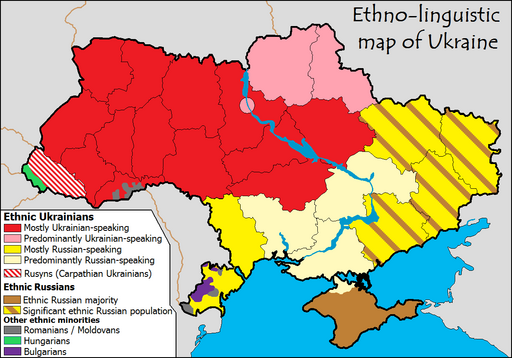By J.G. Collins
As the media and the Obama White House put on their war paint to advise us of the “danger” of the “crisis” in the Crimea, its important to remember that none of what Russia is doing will change the status quo.
1.The Crimea is Historically Russian
The Crimea was Russian territory until 1954 when Soviet Premier Nikita Khrushchev made an entirely ceremonial “gift” of the territory to then Soviet Ukraine.
The situation with the Crimea in the Ukraine is akin to Florida’s panhandle in the Central Time Zone. The panhanlde is home to Pensacola Naval Air Station. If Florida were to become overwhelmingly Cuban and break away from the USA to join Cuba, the United States would demand Pensacola and the panhandle be retained to maintain air superiority over the Gulf of Mexico and the Caribbean. 
2. Russia’s Black Sea Naval Base at Sebastopol is a Vital Russian Interest.
Russia has held the base since 1784, during the reign of Catherine the Great. It is Russia’s only warm-water naval base. They refer to Sebastopol as “Hero City” because it survived a Nazi bombardment during World War II that was to presage a full-fledged occupation and colonization. It is a city of special historical importance to Russia, on a par with Moscow and St. Petersburg.
3. Russia’s Lease of the Sebastopol Naval Base, Which Expires in 2017, Was Set to be Renewed for up to 30 Years.
Deposed Ukrainian leader Viktor Yanukovych was set to continue the lease of the Sebastopol base in the Crimea for 25 (plus another 5) years beyond the 2017 expiration date without any international outcry or even much comment. This, in fact, may be the principal factor driving Putin’s actions. With Yanukoych out of power with little possibility of him being re-instated, Putin likely foresaw that holding on to Sebastopol beyond 2017 with a more Western-leaning Ukraine was increasingly unlikely. So, he used the Ukrainian Crisis as a pretext to ensure Russian control over the Sebastopol base indefinitely.
4. The Ukrainian “Crisis” is Largely About President Obama’s Poll Numbers.
The “crisis” environment is being largely fomented by the Democrat foreign policy establishment and by the Obama Administration to shore up the president’s poll numbers. An enabling press corps serves more to amplify the Obama Administration messaging on the Ukraine than to challenge any of its faulty precepts. There is very little discussion by the press of any of Russia’s historical ties to Sebastopol, the gift of the Ukraine in 1954, or the expiring  lease. Instead, the press has adopted Obama Administration talking points that reflect the Crimea invasion as an “illegal violation of international law” when it is, essentially, a maintenance of the status quo, .
lease. Instead, the press has adopted Obama Administration talking points that reflect the Crimea invasion as an “illegal violation of international law” when it is, essentially, a maintenance of the status quo, .
Vladimir Putin has outmaneuvered and embarrassed the president in Syria, where Bashir al Assad is yet to surrender the chemical weapons he agreed to surrender in September of 2013. Iran has openly castigated the United States, even as it purports to be pursuing a negotiated settlement of claims that it is developing a nuclear weapon. Hamid Karzai has expressed almost open contempt for the president and the United States after more than twelve years of American sacrifice.
The Obama Administration has been the “90 pound weakling” on the world’s beach. The Democrat foreign policy establishment hopes to help bulk him up going into a very precarious midterm election season. Talking tough about the Ukraine helps to do that.
5. Confronting Russia on the Crimea Will Result in Failure and Erode US Credibility.
The United States, NATO, and the European Union can bluster and blather about membership in the G-20 and G-8. They can freeze Russian assets and otherwise prohibit Russian access to their markets. But, ultimately, Russia and Putin will win because they have (a) a far greater and vital interest in maintaining the naval base at Sebastopol and the Crimea as a whole; and (b) they have the means by which to do so.
Short of sending a carrier task force into the Black Sea and committing the United States to an irreversible course of war with Russia, there is very little the United States can do to prevent Russia’s annexation of the Crimea. Pretending that we can (or will) take such a step only tends to diminish the prestige and standing of the United States among our allies. It makes us once again a “paper tiger” among adversaries who count, particularly an expansionist China and a belligerent North Korea.
But there is a means by which the United States can derive some advantage from the Crimean situation.
Instead of stomping feet in frustration over Putin’s move on the Crimea, Secretary Kerry and others in the Obama Foreign Policy circle should step back and cede to the inevitable: Russia will hold the Crimea. But the US can use Russia’s acts committed in the Crimea as a pretext to impose sanctions that can later be lifted upon Putin’s assurance that he will provide bona fide assistance to undermine Syria’s Assad.
Barack Obama has badly mismanaged American foreign policy over the last two years. He can help redeem deeply damaged American credibility to good use in Syria. It’s his only play, given the circumstances.
_________________________________________________________________________
J.G. Collins is the Managing Director of The Stuyvesant Square Consultancy. © 2014 The Stuyvesant Square Consultancy. All rights reserved. For press inquiries or reproduction, please contact us.

Recent Comments